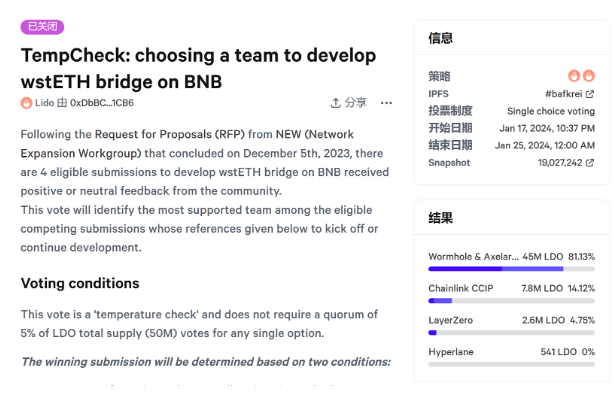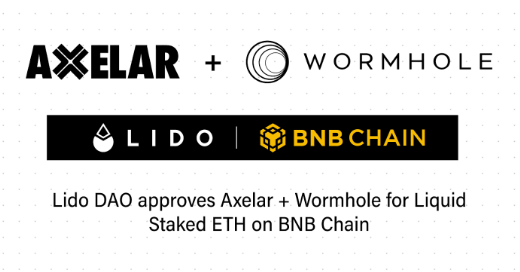In October 2023, LayerZero established a cross-chain bridge for stETH issued by Lido, allowing it to be cross-chained to BNB Chain and Avalanche.
LayerZero sought approval from the governance organization Lido DAO, but deployed the cross-chain bridge before the organization gave it official approval. This is not technically illegal, and the practice is not completely unprecedented - Lido has built various cross-chain bridges in the past, and not all of them have waited for a community vote to launch. However, some members of the Lido DAO community believe that LayerZero’s marketing methods are inappropriate. They believe that LayerZero is trying to pass itself off as an official Lido partner without DAO approval. One member posted on the Lido DAO governance forum: “Announcement of undecided events is disrespectful to the DAO and a clear sign of lack of seriousness.”
A statement signed by a range of crypto infrastructure providers at the time said LayerZero was improperly exploiting its first-mover advantage to lock in users before competitors. Lido strategic advisor Hasu said on the Lido DAO forum: “By unilaterally deploying cross-chain bridges and marketing them in an official way, it seems to be putting pressure on the DAO to avoid liquidity fragmentation. Attracting users through such marketing makes other Cross-chain bridge proposals are limited and put the DAO, Lido stakers, and participating chains in a difficult position.”
As more and more blockchains are created, cross-chain “interoperability” becomes critical, and cross-chain bridges are the critical infrastructure required for cross-chain interoperability to function properly. But these services are also prone to problems, which is why protocols are so important where they grant recognition.
Lido’s endorsement of stETH is seen as an important sign for an interoperability provider, ranking first among DeFi protocols with a TVL of $20.8 billion, according to DeFi Llama.
On January 17 this year, Lido DAO launched a temperature check vote to select the developers of BNB Chain’s wstETH cross-chain bridge. The options included Axelar Wormhole, Chainlink CCIP, LayerZero, and Hyperlane. In the end, Axelar Wormhole’s support rate reached 81.1%, Chainlink’s 14.1%, and LayerZero’s only 4.7%.

Following the upcoming official vote, Axelar Wormhole will soon become the “official” service provider for stETH cross-chain to BNB Chain.

Sergey Gorbunov, CEO of Interop Labs (the developer of Axelar), said in an interview with CoinDesk: “The Axelar and Wormhole teams decided to work together to effectively combine the security of the two networks to provide effective security of cross-chain ETH LST.”
Gorbunov said the goal of Axelar and Wormhole is to prevent service provider entrenchment, in which service providers use their first-mover advantage to permanently entrench themselves in the protocol infrastructure. The Axelar and Wormhole cross-chain methods are open source and extensible, and at the Lido Foundations option, backend extensions may be made to support other cross-chain bridge providers. This composability is one of the hallmarks of the open source approach in the Axelar+ Wormhole proposal that cannot be replicated by other proposals, a flaw that led to a lopsided vote.
Axelar said that the cross-chain bridge will initially only support BNB Chain and may be expanded to other EVM chains in the future.
Robinson Burkey, chief commercial officer of the Wormhole Foundation, said: In my opinion, this is more than an ordinary governance vote, it becomes more about principles rather than just technology. Token holders can support based on their personal wishes. What’s best in the interest of the protocol, and if you take away that power from token holders, you’re chipping away at the fundamental principles of decentralization.”